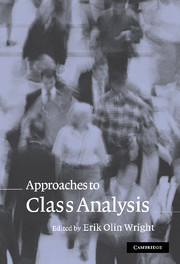Book contents
- Frontmatter
- Contents
- List of figures
- List of tables
- List of contributors
- Introduction
- 1 Foundations of a neo-Marxist class analysis
- 2 Foundations of a neo-Weberian class analysis
- 3 Foundations of a neo-Durkheimian class analysis
- 4 Foundations of Pierre Bourdieu's class analysis
- 5 Foundations of a rent-based class analysis
- 6 Foundations of a post-class analysis
- Conclusion: If “class” is the answer, what is the question?
- References
- Index
2 - Foundations of a neo-Weberian class analysis
Published online by Cambridge University Press: 22 September 2009
- Frontmatter
- Contents
- List of figures
- List of tables
- List of contributors
- Introduction
- 1 Foundations of a neo-Marxist class analysis
- 2 Foundations of a neo-Weberian class analysis
- 3 Foundations of a neo-Durkheimian class analysis
- 4 Foundations of Pierre Bourdieu's class analysis
- 5 Foundations of a rent-based class analysis
- 6 Foundations of a post-class analysis
- Conclusion: If “class” is the answer, what is the question?
- References
- Index
Summary
Introduction
In the broad project of “class analysis” a great deal of effort goes into defining class and delineating the boundaries of classes. This is necessarily so, because class analysis is “the empirical investigation of the consequences and corollaries of the existence of a class structure defined ex-ante” (Breen and Rottman 1995b, p. 453). By starting from a particular definition, sociologists can assess the extent to which such things as inequality in life chances among individuals and families are structured on the basis of class. This approach stands in contrast to one that discovers a class structure from the empirical distribution of inequality in society (Sørensen 2000 labels this the “nominal classifications” approach). In class analysis the theoretical underpinnings of the version of class that is being used have to be made clear at the outset, and the concept of class has to be operationalized so as to allow claims about class to be tested empirically. If we examine the two main varieties of contemporary class analysis – namely Marxist class analysis, particularly associated with the work of Erik Olin Wright and his associates, and the neo-Weberian class analysis linked to the use of the class schema devised by John Goldthorpe – we find that these two tasks are central to both.
In this chapter I will discuss some of the issues involved in seeking to pursue class analysis within a broadly Weberian perspective.
- Type
- Chapter
- Information
- Approaches to Class Analysis , pp. 31 - 50Publisher: Cambridge University PressPrint publication year: 2005
- 73
- Cited by



